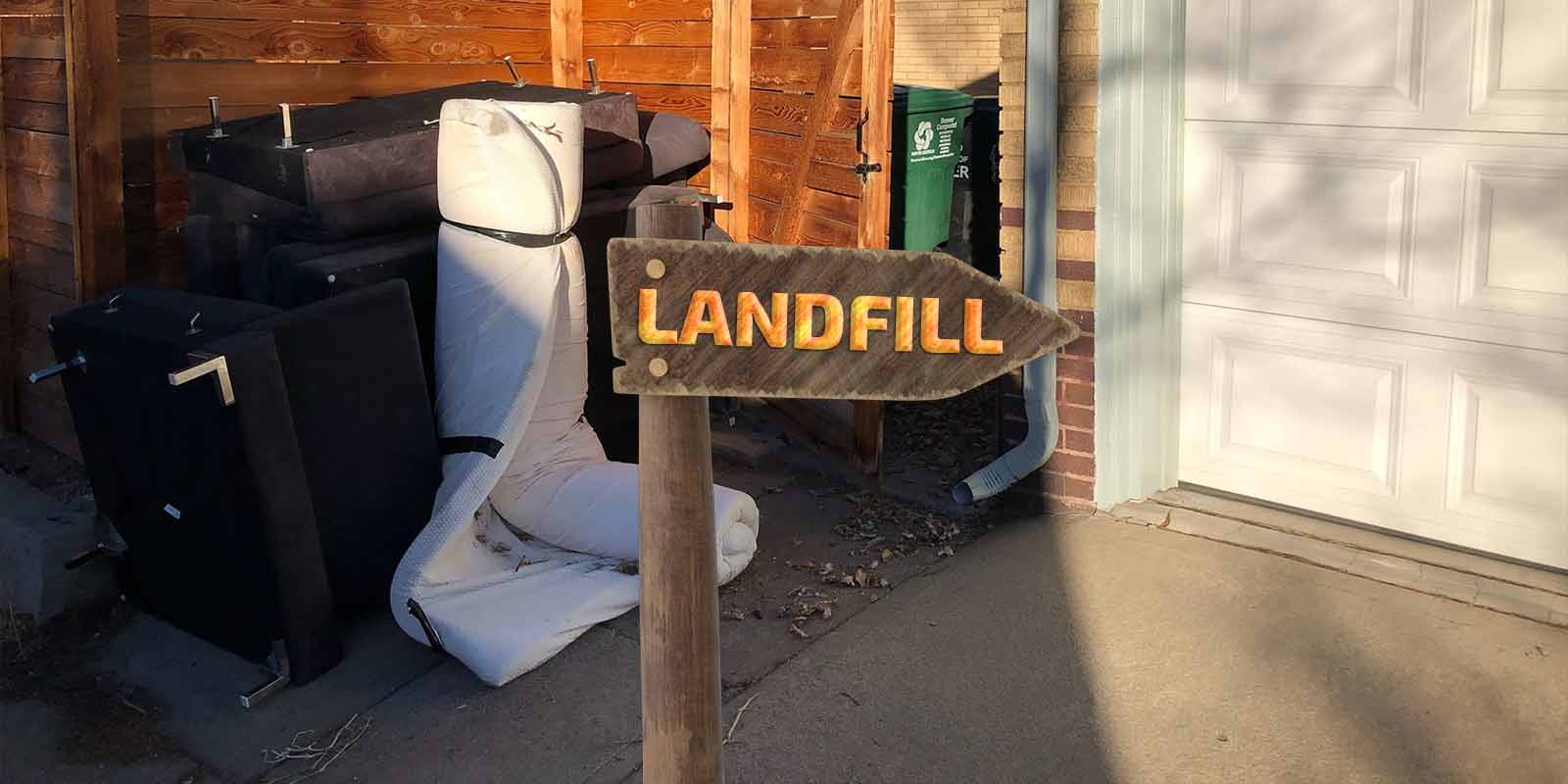A Crossroads for Clutter
When you’re faced with decluttering or replacing old items, you often have two main choices: throwing things in the landfill or donating them. While the landfill might seem the easiest option, donation offers significant environmental, economic, and social benefits. This post explores the pros and cons of both options and helps you make a sustainable decision.
Why Landfills Are the Go-To for Many
Dumping items in The trash is convenient, simple, and fast. But before you do this, it’s crucial to understand the implications.
The Cons of Landfilling:
- Environmental Impact: Landfills are one of the largest sources of methane, a potent greenhouse gas contributing to global warming.
- Space Scarcity: Landfills are rapidly filling up, with space becoming limited across the U.S.
- Health Risks: Decomposing waste releases toxic chemicals and leachate that can contaminate soil and water.
While sometimes necessary for specific hazardous materials or waste beyond repair, landfills should be a last resort.
The Case for Donation: An Eco-Friendly Option
Donation offers an alternative that benefits the environment and people in need. Here’s why donating is better than sending items to the dump:
- Reduces Waste: Donating old furniture, electronics, or clothes diverts these items from landfills, reducing the strain on landfill capacities and lowering environmental damage.
- Economic Benefits: Many donation centers, like Goodwill or The Salvation Army, offer tax deductions for donations. This not only saves money but also helps you contribute to charitable causes.
- Social Impact: Items you donate can help people in need. From families furnishing their homes to students needing affordable electronics, your donations can make a significant difference.
What to Donate and Where
Before donating, ensure your items are in good condition. Here’s a list of everyday items accepted by donation centers:
- Furniture: Couches, chairs, tables, or beds.
- Electronics: Laptops, phones, or televisions in working condition.
- Clothes: All seasons, including shoes and accessories.
- Books & Toys: Popular with libraries and children’s charities.
Here are a few well-known donation options:
- Goodwill: Offers drop-off centers nationwide.
- Habitat for Humanity Restores: Accepts furniture, appliances, and building materials.
- Local Charities and Thrift Stores: Great for donating locally and helping your community.
Landfill vs. Donation: Which to Choose?
When to Choose the Landfill:
- Items that are broken beyond repair.
- Dangerous waste, such as electronics, may contain hazardous materials (check for local recycling programs first).
- Items contaminated with pests or mold cannot be reused.
When to Choose Donation:
- Usable items in decent condition.
- Items that can benefit others (think furniture, clothes, toys, and electronics).
- Items you want to avoid adding to a landfill to help protect the environment.
Super Junkers Can Help!
When you’re unsure what to do, Super Junkers offers junk removal services emphasizing eco-friendly disposal. Whether you need to clear out furniture, appliances, or yard waste, we can help you sort out what can be donated and what must go to the landfill.
The Legal Framework Behind Waste Disposal
When it comes to disposing of your old stuff, it’s not just an environmental or personal decision—there are legal frameworks that dictate how waste should be managed. Local, state, and federal laws govern both landfills and donation processes. Understanding these regulations ensures that you stay compliant and avoid penalties while making responsible choices for waste management.
Landfill Regulations: What the Law Says
Landfills in the U.S. are strictly regulated to minimize environmental and health impacts. Various laws govern the management and disposal of solid waste, ensuring that landfills are operated safely and efficiently.
Federal Regulations: The Resource Conservation and Recovery Act (RCRA)
The RCRA, passed in 1976, gives the Environmental Protection Agency (EPA) authority to control hazardous waste from “cradle to grave,” which includes the generation, transportation, treatment, storage, and disposal of hazardous waste. RCRA also addresses non-hazardous solid waste and ensures that landfills comply with safety standards.
Essential requirements under RCRA include:
- Location Restrictions: To minimize risk, landfills must be located away from wetlands, fault lines, or other protected areas.
- Liner Systems and Leachate Collection: Modern landfills must have protective liners to prevent contaminants from leaching into the groundwater.
- Groundwater Monitoring: Landfills must implement ongoing groundwater monitoring to detect and address contamination immediately.
State Regulations and Local Ordinances
Each state and municipality may have additional laws and guidelines for landfill use. For example, the Colorado Department of Public Health and Environment oversees landfill operations, requires permits for landfill facilities, and regulates the type of waste allowed, closure procedures, and post-closure care.
In Denver, specific regulations in Chapter 48 of the municipal code govern how garbage and waste, including construction debris and household trash, should be handled. Violations can result in fines and penalties, emphasizing the need for compliance with local rules.
Donation: A Legal and Responsible Disposal Option
Donating items can be a highly beneficial alternative to landfills from a legal and social perspective. Unlike waste disposal, which is heavily regulated due to its environmental impact, donations are encouraged through various legal incentives.
Tax Benefits for Donations
The IRS allows individuals and businesses to claim tax deductions for items donated to qualified charitable organizations, as Section 170 of the Internal Revenue Code (IRC) outlines. To qualify for a deduction, the donation must be made to a registered 501(c)(3) nonprofit organization, and the value of the donation must be appropriately documented.
Key legal considerations when donating:
- Fair Market Value: The IRS requires donors to assess the “fair market value” of their items, which is a willing buyer’s price. Overstating values can result in penalties.
- Documentation: For donations above $500, detailed documentation, including receipts and descriptions of donated items, is required.
The Charitable Donation Law
Some laws protect both donors and recipients. For example, the Good Samaritan Donation Act protects donors from liability if donated goods are later found defective or cause harm, as long as the donation was made in good faith. This encourages more people to donate without the fear of lawsuits.
Waste Hierarchy in Law: Prioritizing Reduction, Reuse, and Recycling
The legal framework around waste management is based on a hierarchy prioritizing waste reduction, reuse (such as donation), recycling, and finally, disposal. According to the EPA’s Waste Management Hierarchy, sending waste to the landfill should be the last resort after attempting to recycle or donate.
Several states have also passed laws that support donation as a preferred method of disposal:
- California’s Mandatory Commercial Recycling Law encourages businesses to donate excess goods rather than sending them to landfills.
- Colorado promotes recycling and donation initiatives as part of its Producer Responsibility Authorization, which outlines methods for reducing waste sent to landfills.
Penalties for Improper Waste Disposal
Disposing of waste improperly, either by illegal dumping or by placing prohibited items in landfills, can lead to hefty fines and legal repercussions. In Denver, violations of solid waste disposal regulations under Chapter 48 can result in penalties or criminal charges for illegal dumping.
To avoid penalties:
- Ensure that hazardous materials like electronics, paint, or appliances are disposed of properly through certified recycling centers or disposal facilities.
- Follow the specific guidelines laid out by local waste management laws to ensure that items sent to landfills meet legal requirements.
How Super Junkers Helps You Stay Compliant
At Super Junkers, we prioritize eco-friendly disposal and compliance with all relevant laws. Whether cleaning out a garage or decluttering your home, our team ensures that items are donated, recycled, or disposed of according to federal, state, and local regulations. We guarantee that what can be donated is delivered to the appropriate charities, reducing the strain on landfills and maximizing your contribution to the community.
Conclusion: Every Choice Matters
When decluttering, it is essential to weigh the benefits of donating versus dumping. With landfills overflowing, donating offers a way to keep your space clean while helping the environment and your community. If you’re unsure how to get started, Super Junkers is just a phone call away for all your junk removal needs.
Call us today at (720) 248-7076 to schedule a pickup and give your old items a new life!





